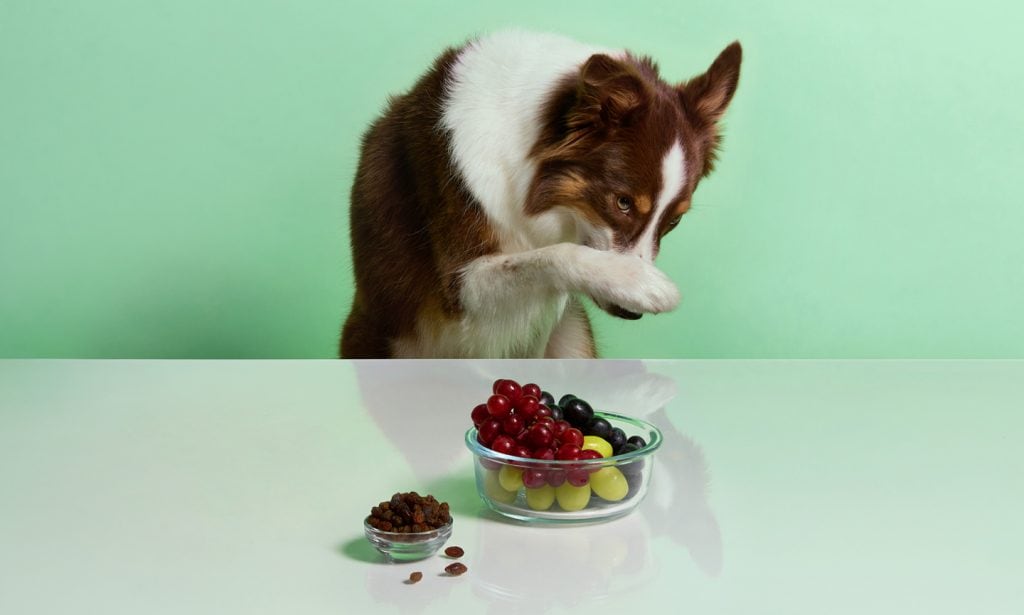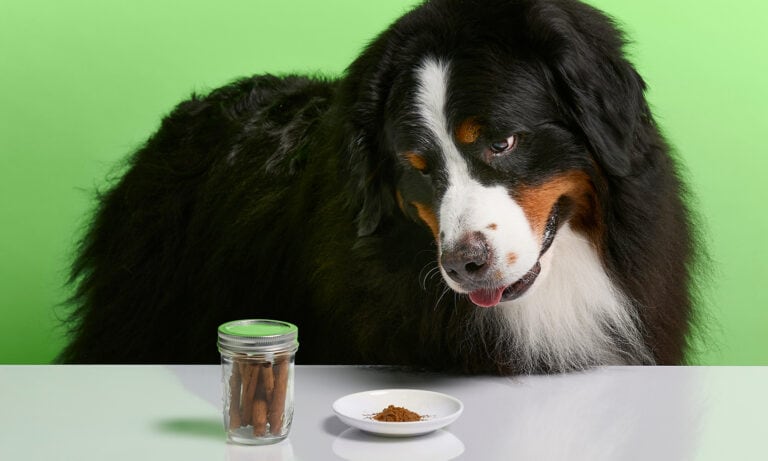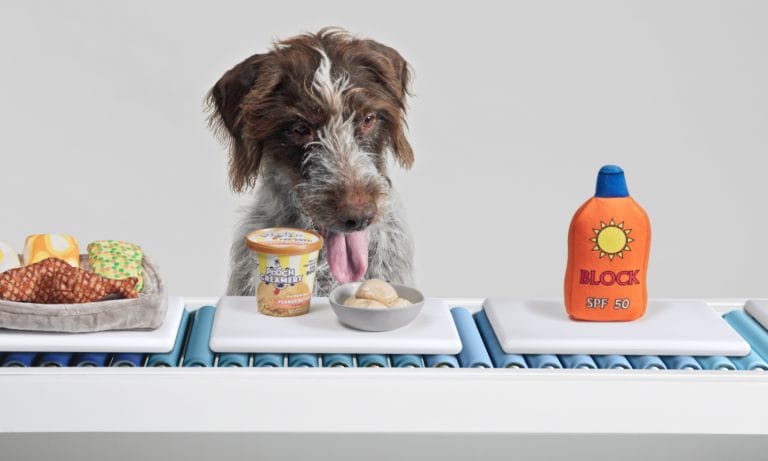Can dogs eat grapes? While there are many fruits and vegetables that make delicious and nutritious treats for dogs, grapes and raisins are not among them. In fact, they’re often highly toxic to dogs even in small quantities and can also pose a choking hazard, so pups should avoid eating them at all costs.
We spoke with several experts to get all the facts about why grapes and raisins are so dangerous, and what to do if your dog eats any quantity.
In This Guide:
Dangers of Grapes and Raisins for Dogs
Grapes and raisins are both highly toxic to dogs and can cause serious illness, even if a pup eats only a single grape or raisin.
New veterinary studies suggest that the likely toxic component in grapes and raisins is tartaric acid.
Typically, with other poisons, smaller dogs are at a higher risk since only a small amount may cause toxicity, but with grapes and raisins, it’s hard to predict how each dog may react to the amount they ingest, as the concentration of tartaric acid in a grape or raisin may vary.
Jamie Whittenburg, DVM, founder of Kingsgate Animal Hospital in Lubbock, Texas, says the main effect of eating grapes or raisins is on a dog’s kidneys—and that eating just a small amount can lead to kidney damage or acute kidney failure, requiring prompt medical treatment.
The most common symptoms of grape or raisin poisoning in a dog include:
- Lethargy or weakness
- Vomiting or diarrhea
- Loss of appetite
- Increased drinking and urination (or no urine production)
- Abdominal pain
- Dehydration (signs may include dry or sticky gums, drooling, thick saliva, dry nose, panting, and sunken eyes)
- Bad or strong-smelling breath
- Neurological signs, such as muscle tremors, a head tilt, dizziness, or seizures
Due to varying amounts of the toxins in grapes and raisins, there’s no telling how many grapes it takes to create a toxic dose. Some dogs will go into kidney failure after consuming a small amount, while others will have no side effects after eating a lot more.
Because it’s impossible to predict what will happen, the best course of action is to keep all grapes and raisins out of paw’s reach. Grapes, raisins and dogs just don’t mix!
Pet parents should also keep a close eye on their pup to make sure they don’t go counter-surfing for foods that contain grapes or raisins, such as salads, cookies and cakes. Beyond the toxicity of grapes and raisins, these foods often have added ingredients like xylitol, which is toxic to dogs, plus considerable amounts of sugar that can also cause health problems.
What To Do If Your Dog Eats Grapes or Raisins
Call Your Vet
Symptoms of grape or raisin poisoning typically appear within six to 12 hours after consumption. If your dog experiences any of the above signs of grape or raisin poisoning, call your veterinarian immediately.
However, if you see your dog eat even a small amount of grapes or raisins, don’t wait for symptoms to appear. Your dog could seem to be fine, but it’s still best to call your vet as a precaution if your dog ate grapes. If you need help finding a vet near you, try Chewy’s Connect with a Vet service.
Here are some things your veterinarian may do once you’re at their office:
- Induce vomiting: This is to help get as many grapes or raisins out of your dog’s system as possible. Never do this on your own at home unless specifically advised by a vet.
- Conduct a blood test: This will be useful in assessing kidney function.
- Put your pup on fluids: Intravenous fluid therapy (fluids into your dog’s vein) will help flush any toxins out of their system.
Ask a Poison Helpline Expert
Call the Pet Poison Helpline at (855) 764-7661 if you’d like more information about how grapes may affect your dog’s health and to start an expert toxicology consultation and specific treatment plan for your dog. Consultation fees often apply.
You will need to provide details such as your dog’s breed, age, weight, and how many grapes or raisins they ate.
Typically, they will advise you to seek help from a local emergency vet, as time is of the essence when it comes to the ingestion of grapes or raisins.
What Human Foods Can My Dog Eat?
Your dog may not be able to eat grapes, but they can enjoy plenty of different human foods, including many fruits. They include:
- Apples
- Bananas
- Blackberries
- Blueberries
- Cranberries
- Oranges
- Mangoes
- Pineapples
- Plain pumpkin
- Strawberries
Before you offer human food to your pup, check with your vet to make sure what foods are safe for your fur baby, as some foods, including fruit, may not be safe for dogs with certain medical conditions, including diabetes, urinary crystals, bladder stones, allergies, gastrointestinal disease, and Cushing’s disease, among others.
Also, be sure you’re feeding your dog the right type of fruit (e.g., fresh/frozen versus dehydrated) and the correct serving size.
FAQs About Dogs and Grapes
Q: Can dogs have grape juice?
A:No, you should not feed your dog grape juice. It is derived from grapes, so it can also be toxic. Even ingestion of juices that are grape-flavored could be harmful.
Q:Can dogs eat frozen grapes?
A:No, dogs cannot eat frozen grapes. They contain the same toxins and could also present a choking hazard to your dog.
Q:Can dogs eat grape jelly or jam?
A:Dogs cannot eat grape jelly or jam. They’re also made from grapes; therefore, they contain the same toxic substances found in the whole fruit.
Q:Can my puppy eat grapes? What should I do if my puppy ate grapes?
A:No, your puppy cannot eat grapes because they can be toxic to puppies, just as they are to adult dogs.
“You can offer plenty of other healthy snacks without the potential to cause them harm,” says Jeni Nezerka, DVM, an emergency veterinarian and medical director for the Veterinary Emergency Group in Brentwood, Missouri.
If your puppy ate grapes by mistake, immediately call the closest animal hospital to speak to an emergency vet, as grapes can cause kidney failure in some dogs, Dr. Nezerka says.
Q:Can dogs eat green grapes?
A:No, dogs cannot eat green grapes. The type of grape doesn’t matter. Green grapes, red grapes, purple grapes, seedless grapes: None are safe. “All grapes are potentially toxic to dogs,” cautions Dr. Nezerka.
Q:Can dogs eat raisins like sultanas? What about currants?
A:No, your dog cannot eat sultanas (commonly known as golden raisins) or Zante currants, as they can be toxic.
Q:Can I give my dog activated charcoal if they have symptoms of grape poisoning?
A:No, pet parents should not give their dog activated charcoal. Activated charcoal should only be given by your vet.
It can reduce toxins from being absorbed into the digestive tract, but it does involve risks in dogs with certain medical conditions including severe dehydration, kidney failure, and seizures.
Your vet will determine if activated charcoal is the best treatment for your dog.
More foods to keep away from dogs:
Share:









